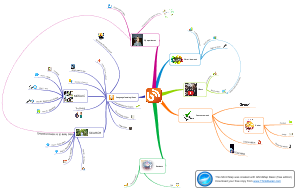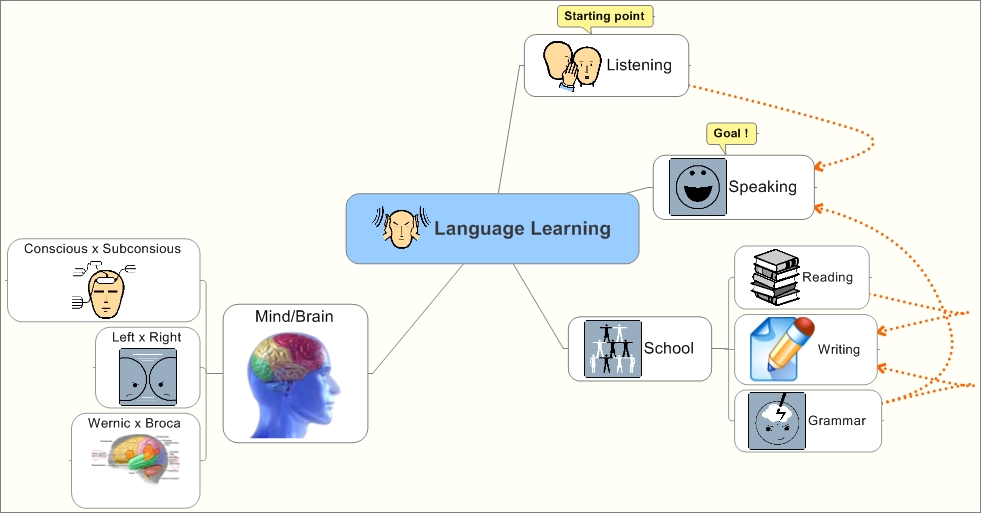Protagonists: me (“a little me”) and ME (Jirka Slaba)
me: So, there is that promised “English story” today?
ME: No.
me: Why?
ME: I do not write the BLOG every day.
me: Why not?
ME: Because I am busy, sometimes.
me: Lazy?
ME: Hm, feel free to use it interchangeably.
me: I have some questions concerning a vocabulary.
ME: Ask.
me: You told that you do not learn single words. What do you do instead of it?
ME: I learn the language, no words. If you read my previous posts you know that “my” method (actually it is not my method at all, nothing is original, we create from existing building blocks...) but to the point – this approach, as you know, is based mainly on listening and listening of KNOWN content. So, you have a transcript and you can easily find the unknown words. At the beginning you will need probably “translate“ this way more or less a complete text, later on only some words. You do not need to create any list from these words – just have their meaning to look at them (in text) from time to time (if necessary).
me: It is much more difficult to understand and learn words in sentences than in separate list as you called it, isn't?
ME: Actually, it is not.
me: I do not understand. I have always had troubles to catch the meaning. It is too quick for me sometimes and on top of it those native speakers! Ach, they connect everything together! It is impossible to get it, it is not perhaps English at all.
ME: It is an English! It is the real English. Yes it differs from your school English. And by the way, for me it is much easier to understand the meaning of worlds in whole sentences – it gives me the context to grasp the meaning – sometimes I understand the particular word only partially (it is kind of game of probabilities) and just the rest of the sentence gives me the global picture which I need to get it. Sometimes I learn a new word without looking to the dictionary at all. Imagine that you have a sentence (or few sentences) and only ONE word is unknown. You can guess relatively well the meaning of it (the one of possible meanings). You are not 100% certain. Let's say only 60% (just for demonstration – actually you do not number any probabilities in you head) After some time you hear the same word in different context. And it either confirms your previous guess or you must to reassess it (or you can look it up in the dictionary (at last) – and it is out of your own natural curiosity – so, you can remember it now forever)
me: You told that some words are more important than others and that they create kind of matrix or mosaic to see the global picture or something like that. How do you distinguish them and do you learn them preferably?
ME: Yes, there are such parts of language which are more important. I learn them preferably although I do not need to distinguish them from the other parts.
me: I do not understand.
ME: Every language has one interesting feature – the most important parts are those parts that repeat itself most often, are more frequent. And those parts you listen naturally most often. You learn them better because of that repetition (and it is not mechanical repetition). It is the other advantage of this approach. In the classical traditional school approach you learn all words from your list and gives them the same priority (plus not taking into consideration the difference between passive and active vocabulary) and it is a big wastage of resources and your mental energy.
me: So, I see that you are so perfect not doing it!
ME: No, nobody is perfect. I do a lot of errors and I learn from them.
me: And you are “Nobody”?
ME: Yes.
me: And WHO AM I?
ME: A good question to the end of our dialog. Ask this question from time to time. Ask it yourself. Bye.
me: Bye.
ME: Dear reader - next time the promised story :-)
me: So, there is that promised “English story” today?
ME: No.
me: Why?
ME: I do not write the BLOG every day.
me: Why not?
ME: Because I am busy, sometimes.
me: Lazy?
ME: Hm, feel free to use it interchangeably.
me: I have some questions concerning a vocabulary.
ME: Ask.
me: You told that you do not learn single words. What do you do instead of it?
ME: I learn the language, no words. If you read my previous posts you know that “my” method (actually it is not my method at all, nothing is original, we create from existing building blocks...) but to the point – this approach, as you know, is based mainly on listening and listening of KNOWN content. So, you have a transcript and you can easily find the unknown words. At the beginning you will need probably “translate“ this way more or less a complete text, later on only some words. You do not need to create any list from these words – just have their meaning to look at them (in text) from time to time (if necessary).
me: It is much more difficult to understand and learn words in sentences than in separate list as you called it, isn't?
ME: Actually, it is not.
me: I do not understand. I have always had troubles to catch the meaning. It is too quick for me sometimes and on top of it those native speakers! Ach, they connect everything together! It is impossible to get it, it is not perhaps English at all.
ME: It is an English! It is the real English. Yes it differs from your school English. And by the way, for me it is much easier to understand the meaning of worlds in whole sentences – it gives me the context to grasp the meaning – sometimes I understand the particular word only partially (it is kind of game of probabilities) and just the rest of the sentence gives me the global picture which I need to get it. Sometimes I learn a new word without looking to the dictionary at all. Imagine that you have a sentence (or few sentences) and only ONE word is unknown. You can guess relatively well the meaning of it (the one of possible meanings). You are not 100% certain. Let's say only 60% (just for demonstration – actually you do not number any probabilities in you head) After some time you hear the same word in different context. And it either confirms your previous guess or you must to reassess it (or you can look it up in the dictionary (at last) – and it is out of your own natural curiosity – so, you can remember it now forever)
me: You told that some words are more important than others and that they create kind of matrix or mosaic to see the global picture or something like that. How do you distinguish them and do you learn them preferably?
ME: Yes, there are such parts of language which are more important. I learn them preferably although I do not need to distinguish them from the other parts.
me: I do not understand.
ME: Every language has one interesting feature – the most important parts are those parts that repeat itself most often, are more frequent. And those parts you listen naturally most often. You learn them better because of that repetition (and it is not mechanical repetition). It is the other advantage of this approach. In the classical traditional school approach you learn all words from your list and gives them the same priority (plus not taking into consideration the difference between passive and active vocabulary) and it is a big wastage of resources and your mental energy.
me: So, I see that you are so perfect not doing it!
ME: No, nobody is perfect. I do a lot of errors and I learn from them.
me: And you are “Nobody”?
ME: Yes.
me: And WHO AM I?
ME: A good question to the end of our dialog. Ask this question from time to time. Ask it yourself. Bye.
me: Bye.
ME: Dear reader - next time the promised story :-)



 RSS Feed
RSS Feed


